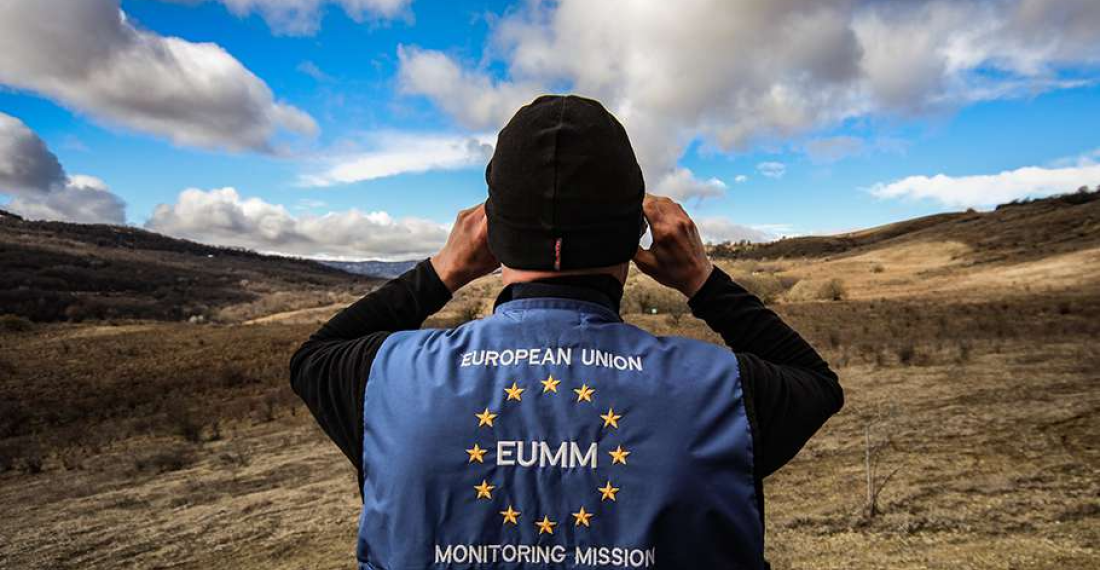On January 23, the Council of the European Union (EU) agreed to establish a civilian monitoring mission in Armenia’s border areas in order to “ensure an environment conducive to normalization efforts between Armenia and Azerbaijan”. The deployment of the mission has caused mixed reactions in the two countries and frustrated Russia, writes Vasif Huseynov in this op-ed for commonspace.eu. He writes that Baku's reaction to the deployment of the EU mission is "ambivalent and can be analyzed along three major lines."
From the Russian perspective, Armenia is a military ally of Russia within the Collective Security Treaty Organization (CSTO), and hence Russia was pushing for the deployment of a CSTO mission instead of that of the EU. Although the Armenian leaders sought to assuage Russia’s concerns by declaring that “the political vector” of Yerevan is not changing, it would hardly suffice to assure the Kremlin. Many local observers anticipate a further degradation in relations between the two allies, which would have significant implications not only for Armenia’s security but also for the Armenia-Azerbaijan peace process. In Baku, therefore, the reaction to the deployment of the EU mission is ambivalent and can be analyzed along three major lines.
Above all, for Baku, the fact that the new mission was deployed to the region without prior consultations and without their consent, is distressing. The previous mission - which was deployed for two months (October 20 – December 19, 2022) - had been agreed in the EU-mediated Prague summit of the Armenian and Azerbaijani leaders on October 6, and Baku made a commitment to cooperate with the mission. This mission was not extended, but then replaced with a larger mission for a longer period without an agreement with Baku.
The Azerbaijani government views this as a manipulation, particularly from the French side, and warns that this would have a negative impact on the peace process. Azerbaijani experts also question the nature of this “France-imposed” mission since the EU demonstrated silence and inactivity when Azerbaijani borders were violated, and its border areas attacked during the thirty years of the Armenian occupation period.
In this sense, there is a contradiction between the declared goal of the mission (i.e. creating an environment conducive for the normalization efforts) and the modus operandi of the adoption of this decision (i.e. the exclusion of one side that is directly concerned). This is therefore likely to have a negative impact also on the EU track of the Armenia-Azerbaijan peace negotiations which have already faced big challenges after the intervention of the Russian side.
Secondly, Baku is concerned that the EU monitoring mission might be exploited by Armenia to avoid its obligations under the trilateral statement of November 10, 2020. There are a number of issues that had been agreed under this statement but remain unimplemented by the Armenian side. This includes, primarily, the re-opening of transportation routes, Armenia’s provision of a land passage between the western parts of Azerbaijan and the Nakhchivan exclave, as well as Armenia’s withdrawal of its armed forces from Azerbaijani territories.
For Baku, the experience of the previous mission - the actual deployment of which the Ministry of Foreign Affairs described as being “accompanied by serious deviations from the agreements reached in Prague, following biased approaches taken by some EU member-states” - creates concerns that the new mission would also cause some complications. The efforts of some EU countries, in particular France, to protect Armenia at all costs even when it is at odds with the international law (as in the case of the French parliament’s recognition of the separatist regime in Karabakh as an independent state) suggest that Armenia might benefit from this mission, staying stubborn in its refusal to implement its obligations.
Last but not least, the fact that the European Union is increasing its presence in the region and acting more assertively is a very important development for the South Caucasus. This would help regional countries to more confidently counter threats posed to their national security from various directions. The deployment of an EU mission to a second country in the region, after Georgia, is therefore a manifestation of the EU’s growing engagement with the South Caucasus. The EU should however not disregard its implications for the Armenia-Azerbaijan peace process. The mission would deliver positive outcomes only if the process is accompanied by meaningful and substantive negotiations and the practical implementation of previously reached agreements, including those on transportation routes.
The resumption of the EU-mediated talks between Baku and Yerevan as well as reactivating the efforts to sign a peace treaty between the two sides would help de-escalate tensions in the region and create a more favorable environment for peace and reconciliation. A complete de-escalation will however hardly be possible without the settlement of the present crisis in the Karabakh region of Azerbaijan created by Moscow's installation of a Russian oligarch as de-facto leader of the separatist regime. The EU has unfortunately limited instruments and leverage to address this crisis, even after the deployment of a long-term monitoring mission to the Armenia-Azerbaijan border.







